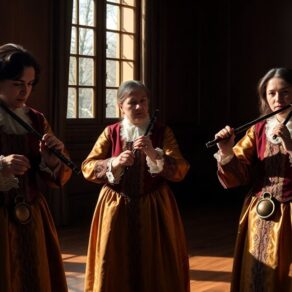You can't fully appreciate the flute's artistry without acknowledging ten masterful performers who've reshaped its narrative. From Jean-Pierre Rampal's poetic interpretations to James Galway's charismatic stage presence, these artists embody emotional storytelling. Julius Baker and Emmanuel Pahud showcase technical intricacy, while Claire Chase pushes innovative boundaries. Each performer—like Sharon Bezaly and Jeffrey Khaner—brings a unique flair to iconic compositions, resonating deeply with audiences. Their collaborations and diverse repertoire invite listeners on a transformative journey. These musicians don't just play notes; they foster emotional connections that redefine what it means to experience flute music. There's much more to uncover.
Key Takeaways
- Jean-Pierre Rampal's interpretations of Baroque pieces redefined flute performance, showcasing emotional depth and technical mastery.
- James Galway's crossover appeal blends classical and contemporary styles, making him a beloved figure in flute music.
- Emmanuel Pahud's innovative approach brings contemporary works to the forefront, expanding the flute's repertoire significantly.
- Jeffrey Khaner's performances highlight breath control and sound quality, elevating emotional storytelling through music.
- Julius Baker's mentorship shaped many prominent flutists, emphasizing individuality and expression in their musical journeys.
Jean-Pierre Rampal
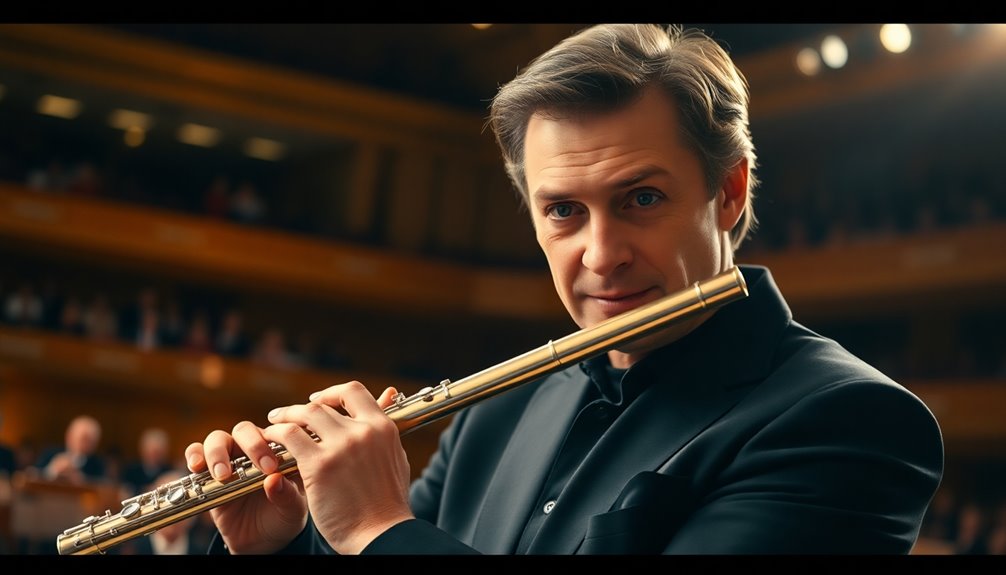
When you think of the flute, Jean-Pierre Rampal's name often emerges as synonymous with the instrument's elevated status in classical music. His artistry and innovative approach transformed how audiences perceive the flute, making it not just an accompaniment but a leading voice in orchestral and solo settings.
Rampal's Legacy isn't confined to his numerous recordings; it lies in the way he expanded the flute's repertoire and inspired generations of musicians.
Rampal mastered a variety of Flute Techniques that set a new standard for performance. His breath control and lyrical phrasing created a sound that was at once ethereal and commanding. You can imagine standing in a concert hall, surrounded by the shimmering tones he produced, each note crafted with precision and passion.
This wasn't merely about technical skill; it was about conveying emotion, making the music resonate deeply with listeners. His expertise in breath control techniques allowed him to sustain notes with remarkable clarity and expression.
Rampal pushed boundaries, collaborating with composers and adapting pieces from other genres, which broadened the flute's appeal beyond classical music. His dedication to teaching also forged connections within the music community, emphasizing the importance of mentorship.
If you aspire to elevate your own flute playing, studying Rampal's techniques and philosophy can provide invaluable insights.
In embracing Rampal's Legacy, you're not just learning about a master flutist; you're connecting with a broader musical heritage that invites you to explore, innovate, and express your own unique voice.
Through Rampal, the flute becomes not just an instrument but a vehicle for profound artistic expression.
James Galway
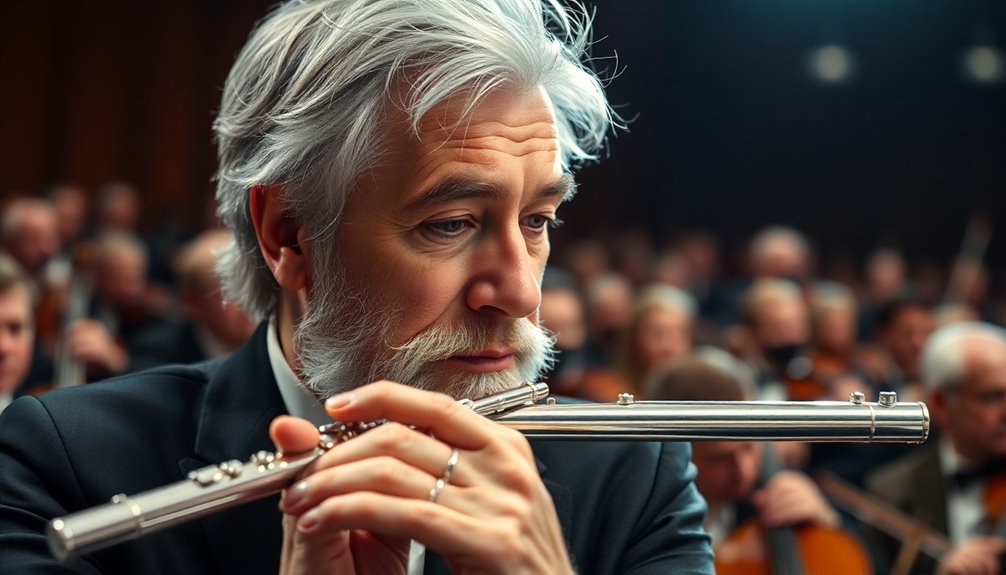
Jean-Pierre Rampal laid a strong foundation for the flute's prominence, but James Galway took it to dazzling new heights. With an unparalleled ability to blend technical mastery with emotional depth, Galway's technique became a hallmark of modern flute playing. His breath control and agility allow for a fluidity that captivates audiences, making even the most complex passages seem effortless.
Galway's iconic performances have redefined what it means to be a flutist. Whether it's his enchanting renditions of classical masterpieces or his explorations into the domains of pop and folk music, he invites listeners into a world where the flute isn't just an instrument, but a voice that speaks to the soul. You can't help but feel that he's not merely playing notes; he's crafting stories that resonate deeply with everyone in the room.
His collaborations with other artists also highlight his versatility, bridging genres in ways that invite both seasoned aficionados and newcomers to appreciate the flute's rich tapestry. When you witness Galway in concert, you become part of a shared experience, a community bound by the magic of music.
Yet, it's not just his performances that matter; it's how he makes you feel. Galway's ability to connect with his audience through his artistry fosters a sense of belonging, making each performance a celebration of shared passion for music. Moreover, Galway's innovative approach often incorporates extended techniques, showcasing the flute's expressive capabilities and inspiring a new generation of flutists.
In a world filled with noise, Galway reminds us that true artistry transcends boundaries, uniting us all through the universal language of melody.
Julius Baker
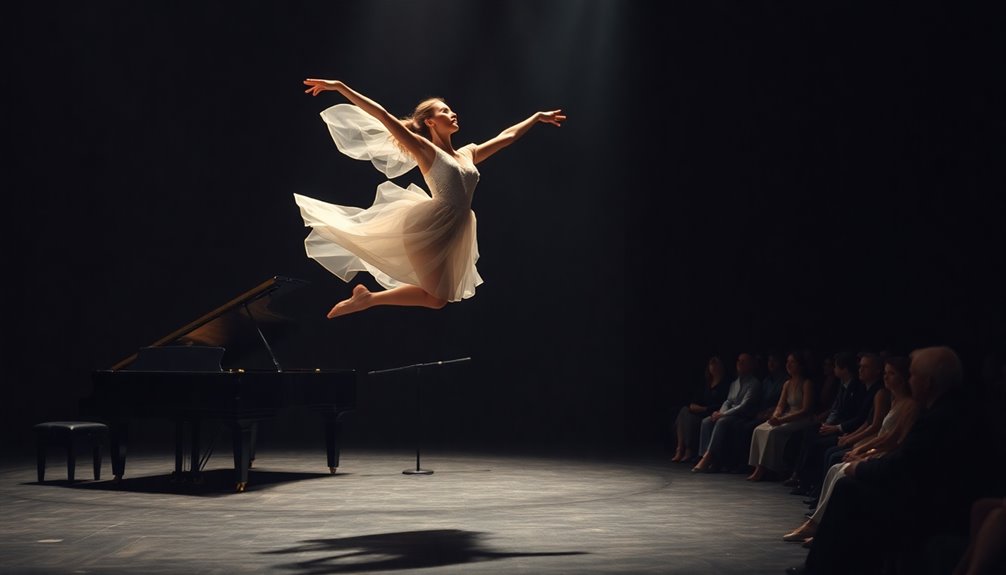
Julius Baker, often celebrated as one of the most influential flute teachers of the 20th century, reshaped the landscape of flute pedagogy with his innovative methods and profound understanding of sound production. His approach to teaching was more than mere instruction; it was a philosophy that encouraged personal expression and mastery of the instrument. You may find yourself intrigued by how Baker's techniques have left an indelible mark on countless flutists.
Baker's influences came from a rich tapestry of musical traditions, blending classical rigor with the freedom of jazz. This unique fusion allowed his students to explore their individuality while grounding them in solid technical skills. His emphasis on tone quality and breath control set a new standard for flute playing, inviting you to investigate deeper into your own sound production. The flute's versatility is a testament to the broad musical styles that Baker encouraged his students to explore.
Here's a concise overview of Baker's contributions:
| Aspect | Details |
|---|---|
| Teaching Style | Encouraged personal expression |
| Technical Focus | Tone quality and breath control |
| Musical Influences | Classical and jazz traditions |
| Legacy | Influenced generations of flutists |
As you reflect on Baker's teachings, consider how they resonate with your own journey. His legacy isn't just about the techniques; it's about fostering a community of passionate, expressive musicians. Embrace this connection, and let Baker's influence inspire your path as a flutist.
Emmanuel Pahud
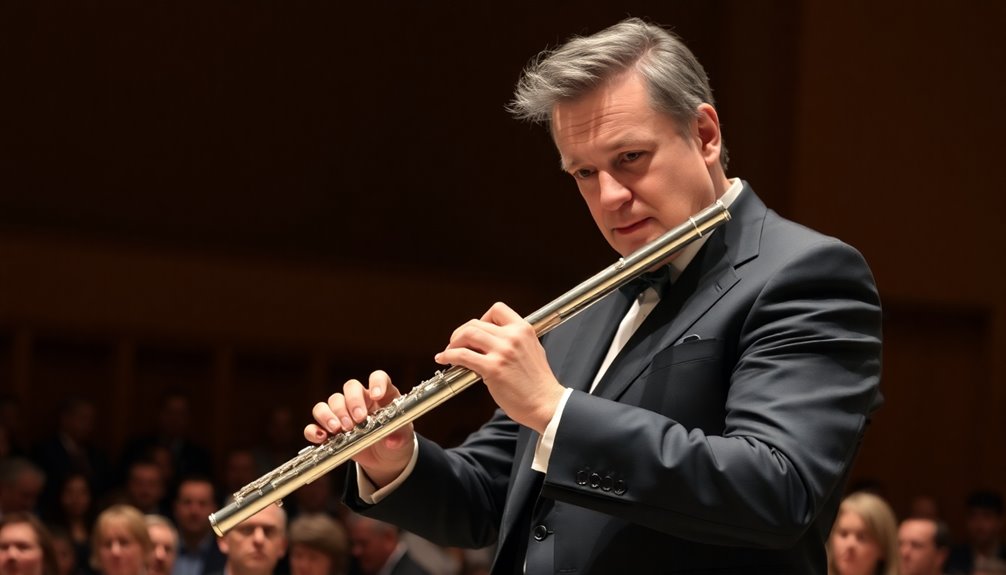
Emmanuel Pahud stands out as a preeminent figure in the world of flute performance, enchanting audiences with his technical prowess and expressive artistry. His mastery of Pahud techniques sets him apart, allowing you to experience the flute in ways you never imagined. When he plays, each note resonates with a clarity that reveals not just skill, but a deep emotional connection to the music.
You might wonder how he achieves such a profound impact. It's not merely about the notes; it's about how he interprets the Pahud repertoire. He navigates through Baroque, Classical, and contemporary pieces with an ease that makes even the most complex compositions sound effortless. You can feel the intensity in his performances, as he seamlessly blends technique with emotion, drawing you into the narrative of each piece.
Pahud's choices in repertoire often reflect his desire to bridge tradition and innovation. His collaborations with composers and other musicians push boundaries, inviting you into a world where the flute transcends its conventional role. This dynamic approach resonates with those seeking a deeper connection to music, making you feel part of something greater. Notably, his performances often incorporate extended techniques that enhance emotional expression and showcase the flute's versatility.
As you listen, you may find yourself questioning the very nature of performance. Pahud invites you to rethink what it means to be a musician—he's not just playing an instrument; he's crafting an experience. In his hands, the flute becomes a voice, and you're left captivated, longing for more.
Sir James Galway
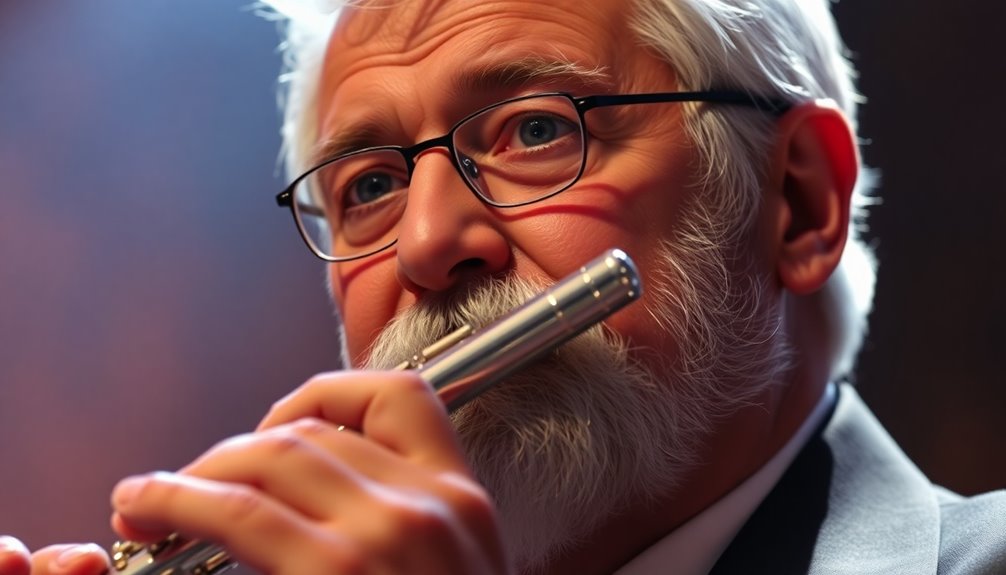
Often regarded as the quintessential flutist, Sir James Galway captivates audiences with a blend of virtuosity and charisma that few can match. His mastery over flute techniques transcends mere execution; it's the emotional depth and storytelling that truly resonate with listeners. Galway's ability to infuse every note with passion turns performances into profound experiences, creating a unique bond between him and his audience. His performances frequently showcase classical flute solos, demonstrating not only technical prowess but also a deep connection to the musical narrative.
| Aspect | Description | Impact |
|---|---|---|
| Flute Techniques | Mastery of breath control and phrasing | Elevates musical expression |
| Musical Collaborations | Diverse partnerships across genres | Expands the flute's repertoire |
| Stage Presence | Charismatic and engaging performances | Draws in audiences of all backgrounds |
| Inspirational Works | Compositions that evoke deep emotions | Leaves lasting impressions on listeners |
Galway's collaborations with renowned musicians and orchestras have pushed the boundaries of what the flute can achieve. These partnerships highlight his versatility, proving that the flute isn't just an orchestral instrument but a powerful voice in various musical landscapes. His work with contemporary composers and traditional classics alike showcases how he bridges genres, inviting everyone to appreciate the flute's versatility.
In an age where music often feels fragmented, Galway's artistry fosters a sense of belonging, inviting listeners from all walks of life to join him on an unforgettable journey. Whether you're a seasoned musician or a casual listener, his performances remind you that music is a universal language, capable of uniting us all.
Robert Stallman
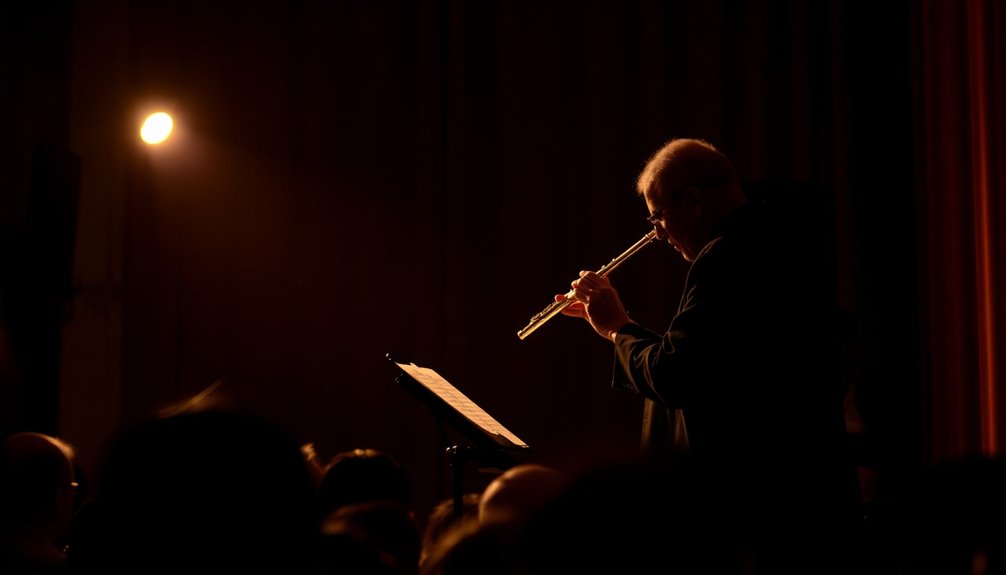
While Sir James Galway has redefined the flute's role in contemporary music, Robert Stallman brings his own distinct artistry and innovative vision to the forefront. You can see Stallman's influence in his remarkable ability to fuse classical traditions with modern sensibilities. His performances resonate with a depth that invites listeners into a shared emotional experience, transcending mere technical prowess.
Stallman techniques aren't just about mastery of the instrument; they embody a philosophy that emphasizes expression and connection. You'll notice how he uses breath control and phrasing to create a narrative, transforming each piece into a compelling story. This approach invites you to reflect on the music's emotional landscape, making each note feel like a conversation rather than a recital.
Moreover, Stallman influences extend beyond his own performances. He's a mentor to emerging flutists, advocating for a style that values individuality over conformity. His teachings challenge students to explore their unique voices, embracing the personal journey of musical discovery. Practicing scales and arpeggios is a key component in developing the technical skills necessary for this exploration.
This community-oriented mindset fosters a sense of belonging among flutists, encouraging them to share their interpretations and experiences. As you explore Stallman's artistry, consider how his innovative techniques and profound influences shape not just the music world, but also the community around it.
His work invites you to engage, to feel, and to connect, reminding you that music is as much about human experience as it's about notes on a page.
Claire Chase

Claire Chase stands as a transformative figure in the world of contemporary flute performance, redefining not just the instrument but the very essence of musical exploration. You can't help but be captivated by her approach, which seamlessly blends traditional flute techniques with groundbreaking innovations. Chase doesn't merely play; she challenges the boundaries of what the flute can express, inviting you to rethink your own understanding of music.
Her dedication to expanding the contemporary repertoire is remarkable. Chase collaborates with composers, commissioning new works that push the envelope. This commitment not only enriches the flute's literature but also fosters a sense of community among performers and listeners alike. You're drawn into a world where the flute serves as a canvas for diverse voices and ideas, creating an inclusive space for musical dialogue.
What sets Chase apart is her fearless exploration of flute techniques. She employs extended techniques—multiphonics, flutter tonguing, and circular breathing—transforming the instrument into a vehicle of profound emotional expression. Each note carries a weight that resonates with your own experiences, making her performances relatable and impactful. Her understanding of acoustical properties enhances the richness of her multiphonic passages, showcasing her technical mastery.
In a time when musical innovation often feels confined to certain genres, Claire Chase breaks free from these limitations. She encourages you to embrace the uncharted territories of sound, urging both musicians and audiences to find belonging in the unfamiliar.
With Chase at the forefront, contemporary flute performance isn't just an art form; it becomes a crucial expression of our collective human experience.
Paula Robison
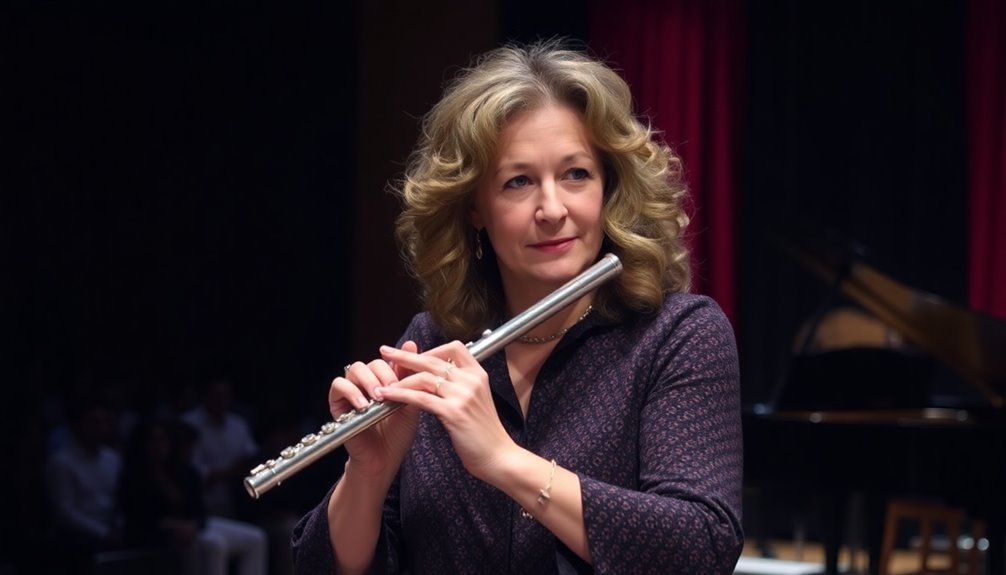
Paula Robison emerges as a pivotal force in the domain of flute performance, seamlessly blending technical mastery with a profound emotional depth. Her artistry invites you into a world where each note resonates with meaning, showcasing not just her skill but also her deep understanding of the flute's voice. Paula Robison's influence extends beyond her performances; she's a mentor and advocate, inspiring countless flutists to explore their own artistic identities.
To truly appreciate Paula Robison's impact, consider the breadth of her repertoire. It encompasses a diverse range of works, from classical masterpieces to contemporary compositions, each chosen for its ability to express the human experience. Here's a glimpse of her iconic contributions:
| Work | Composer |
|---|---|
| Concerto for Flute | Jacques Ibert |
| Flute Sonata | Francis Poulenc |
| Sonatine | Pierre Sancan |
| Three Pieces | C. P. E. Bach |
| Flute Concerto | Carl Philipp Emanuel Bach |
Through this repertoire, Paula not only demonstrates her technical prowess but also her dedication to expanding the flute's role in music. Engaging with her work, you find a sense of belonging within a larger community of musicians and listeners who celebrate the flute's expressive potential. Paula Robison's influence is a reminder that music is not just about notes, but about the connections we forge through sound. Her performances highlight the importance of sound quality and tone, emphasizing how the right instrument can elevate a musician's expression.
Sharon Bezaly
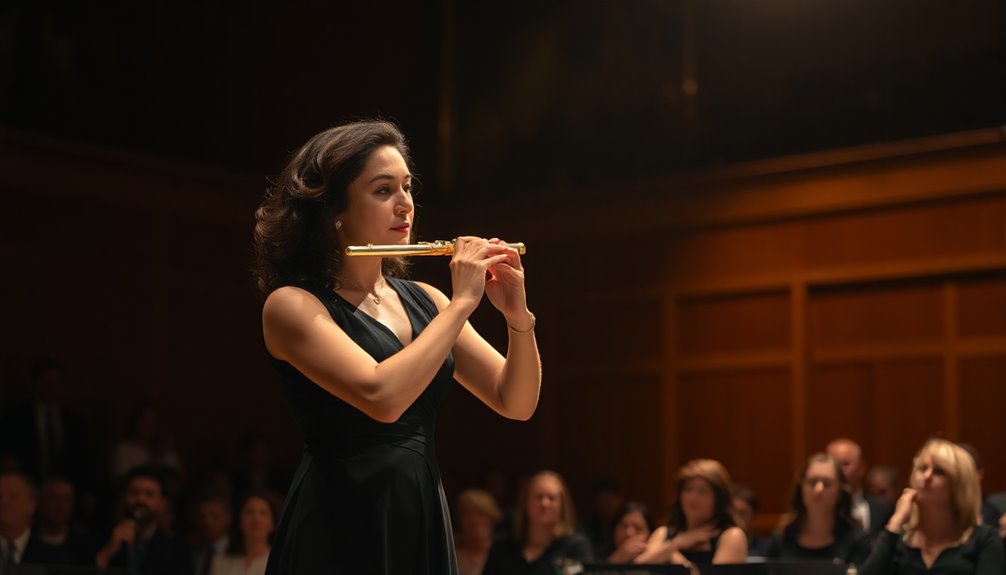
Building on the legacy of transformative flutists like Paula Robison, Sharon Bezaly stands out as a remarkable force in contemporary flute performance. You can't help but be captivated by her innovative approach and the deep emotional resonance she brings to her music. Bezaly's repertoire is nothing short of extraordinary; it spans the classical canon while also embracing modern compositions that challenge the boundaries of the flute.
When you listen to her interpretations, you sense a fearless exploration of sound that invites you to rethink what the flute can convey. Bezaly's techniques reveal her mastery of the instrument. She employs a range of dynamics and articulations that create a tapestry of colors, engaging your senses in ways you mightn't have experienced before.
Her use of extended techniques, such as multiphonics and harmonics, pushes the envelope of traditional flute playing. You might find yourself drawn into the intricate layers of her sound, each note carefully crafted yet bursting with spontaneity.
What's particularly striking is how Bezaly connects with her audience. She doesn't just play notes; she tells stories. Her performances invite you into a shared emotional journey, making you feel as though you're part of something larger. This ability to evoke emotions resonates with the cultural significance of flute melodies, enhancing her performances' depth and connection.
The way she bridges the gap between the performer and audience is a demonstration of her artistry. In Bezaly, you find not just a performer, but a visionary who inspires you to embrace the flute's endless possibilities and to seek your own voice within its melodic embrace.
Jeffrey Khaner
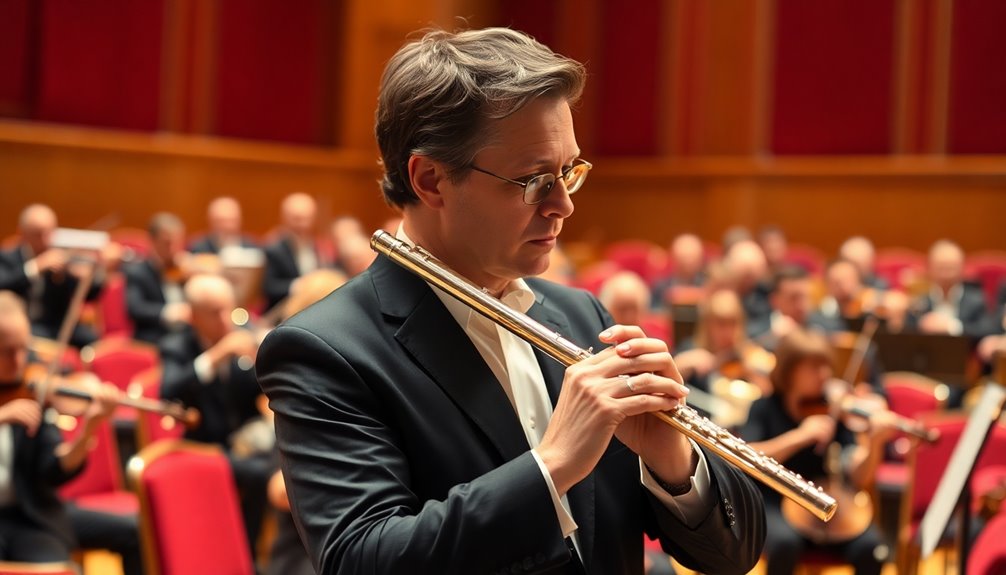
When you experience Jeffrey Khaner's performances, you're not just listening to a flutist; you're witnessing a masterful storyteller weaving intricate narratives through sound. His artistry transcends mere technical proficiency; it's a symbiotic relationship between emotion and execution. Khaner's techniques, honed through years of dedication, reveal a deep understanding of the flute's voice, allowing him to express a range of human experiences. Each note carries weight, inviting you to reflect, to feel, and to connect.
Khaner deftly combines traditional foundations with innovative approaches, pushing the boundaries of flute performance. His use of breath control and dynamic contrast creates a rich tapestry of tonal colors, drawing listeners into his world. You can feel his influence in the way he interprets contemporary works, turning them into living dialogues. It's not just about the music; it's about the messages that resonate within it.
In a landscape crowded with technically skilled musicians, Khaner stands out. His ability to evoke emotion makes his performances not merely concerts but shared experiences. When you attend one of his performances, you're part of an intimate gathering, united by the power of music.
Khaner's influence extends beyond the stage; he inspires a generation of flutists to explore their own narratives while emphasizing the importance of connection through sound. His mastery of articulation techniques ensures that every phrase is delivered with intention, enhancing the emotional impact of his performances.
In essence, Jeffrey Khaner invites you to not just listen but to participate in a communal journey, one where each performance is a reflection of collective humanity.
Frequently Asked Questions
What Inspired These Performers to Choose the Flute as Their Instrument?
When you explore why these performers chose the flute, you'll find it's often tied to their personal journeys.
The flute's rich history resonates with them, evoking emotions and a sense of connection. They're drawn to its versatility and expressive sound, which can convey a multitude of feelings.
Each note tells a story, allowing them to articulate their experiences and share their passions with others, creating a community built around shared musical appreciation.
How Do These Musicians Prepare for a Live Performance?
Before stepping into the spotlight, you engage in a delicate dance of rehearsal techniques and mental preparation.
You refine your skills through countless hours of practice, ensuring each note resonates with intent.
As the performance draws near, you visualize success, calming your mind to embrace the moment.
This blend of technique and focus not only sharpens your artistry but also fosters a profound connection with your audience, inviting them into your world of sound.
What Are the Most Common Challenges Faced by Flute Players?
As a flute player, you often face challenges like breath control and finger technique.
Maintaining steady airflow is essential; without it, your sound can falter. You'll also find that mastering finger technique requires precision and agility, especially during fast passages.
Balancing these elements can be frustrating, but overcoming them fosters a deeper connection to your instrument.
Embrace these challenges—they're part of your growth and journey as a musician, and they unite you with others who understand.
How Has Flute Music Evolved Over the Decades?
Flute music's evolution through the decades reflects an enthralling journey.
You'll notice the Baroque influence shaping technical precision and ornamentation, laying a foundation for expressive playing.
As time passed, contemporary styles emerged, blending genres and embracing diverse cultural influences.
This shift invites you to explore new sounds and techniques, fostering a sense of belonging in a vibrant community.
The flute's adaptability mirrors your own growth, encouraging you to push artistic boundaries and redefine musical expression.
What Role Does Improvisation Play in Flute Performances?
Imagine a jazz club, where the air's thick with anticipation and every note feels alive.
In flute performances, improvisation embodies musical spontaneity and creative expression, allowing you to forge a deeper connection with the audience. It transforms a simple melody into a vivid story, inviting listeners to join you on an emotional journey.
Embracing this art form not only enhances your performance but also cultivates a sense of belonging within the vibrant music community.
Conclusion
In exploring the exceptional artistry of these ten flutists, you witness a wondrous tapestry woven with skill, passion, and precision. Each performer, from Rampal's resplendent melodies to Galway's glorious grace, leaves a lasting legacy that echoes through time. Their iconic works not only elevate the flute's status but also ignite inspiration in aspiring musicians. As you investigate their diverse discographies, you can't help but appreciate how their unique voices shape the symphonic story of music itself.



